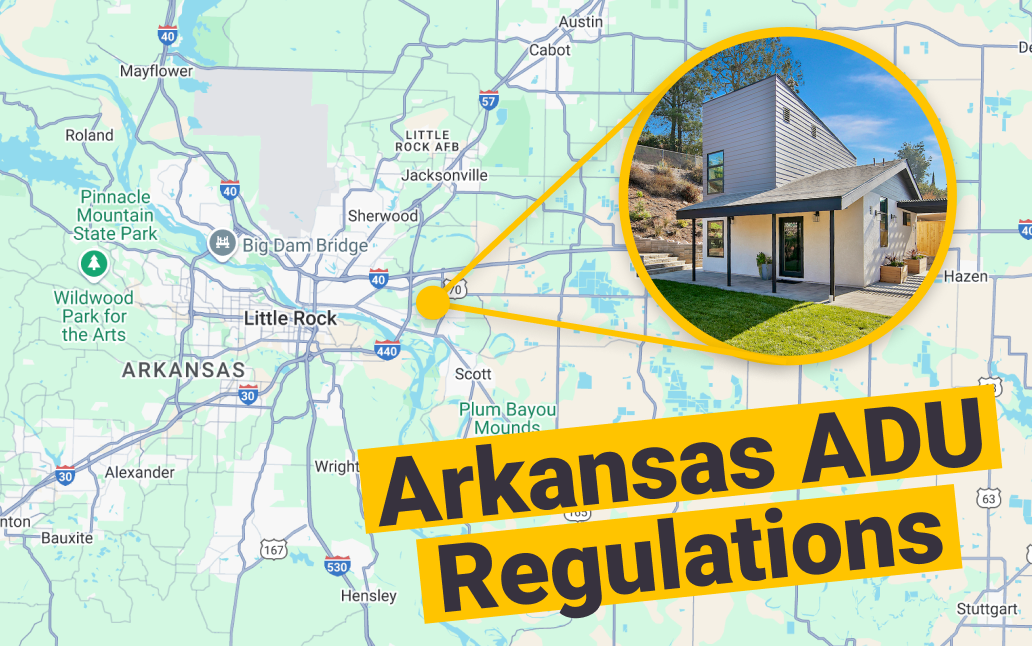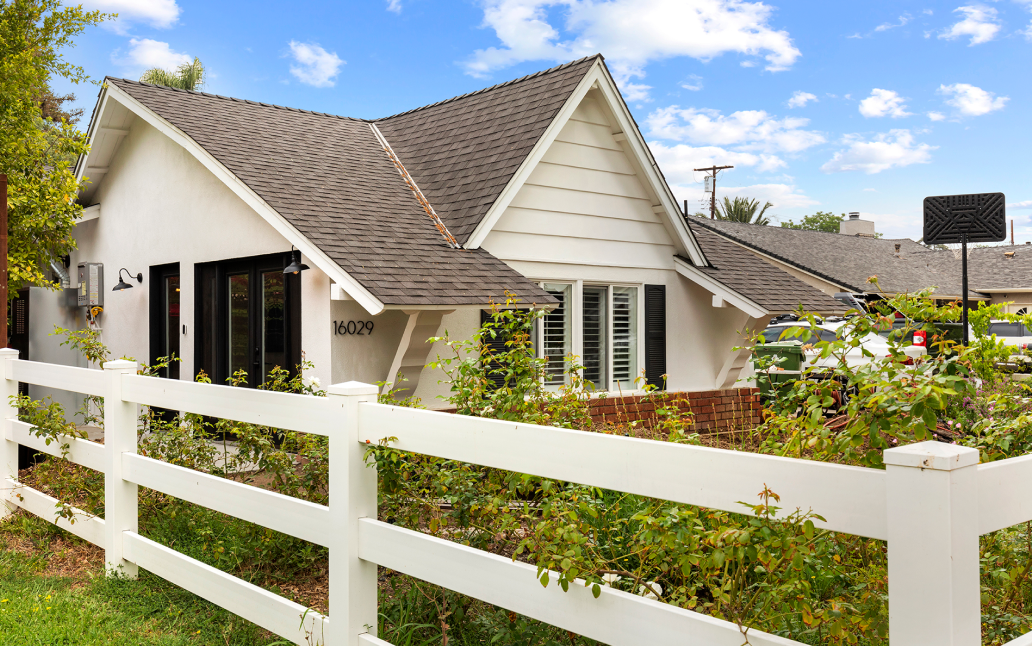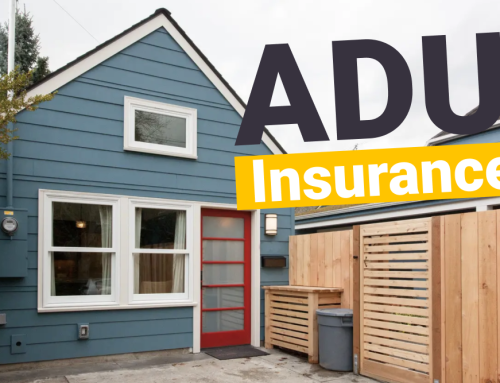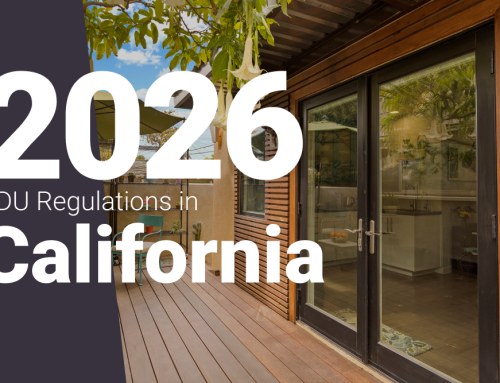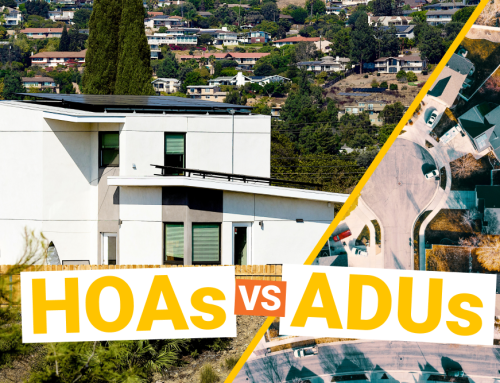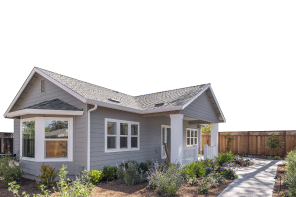Thanks to HB 1503, as of 2025, Arkansas has become the eight state in the U.S. to pass statewide accessory dwelling unit (ADU) regulations. Following in the footsteps of giants like Oregon and California, these regulations aim to stand as a baseline for cities to follow in the attempt to make ADUs more accessible for the average homeowner.
As we’ve seen over the past few years, the housing industry has widely praised these types of initiatives and reported positive results. We’re excited to watch these new regulations make a meaningful impact on the housing supply.
Without further ado, let’s dissect what House Bill 1503 means for you and your ADU project.
What is an Accessory Dwelling Unit (ADU)?
An accessory dwelling unit, more commonly known as an ADU, is a long-term housing structure built on the same property as a primary residence.
More specifically as outlined in HB 1503, it “includes its own cooking, sleeping, and sanitation facilities and complies with or is otherwise exempt from any applicable regulatory requirements.”
Essentially, an ADU in Arkansas, should have all of the essential features of a standalone home—just on a smaller scale. That means a kitchen or kitchenette, a bathroom, a place to sleep, and a separate entrance.
As you can probably guess, having a whole additional private living space on your property can offer a multitude of benefits, so it’s a no-brainer for the state to pass regulations to make them easier to build. Let’s get into it.
Arkansas State ADU Regulations
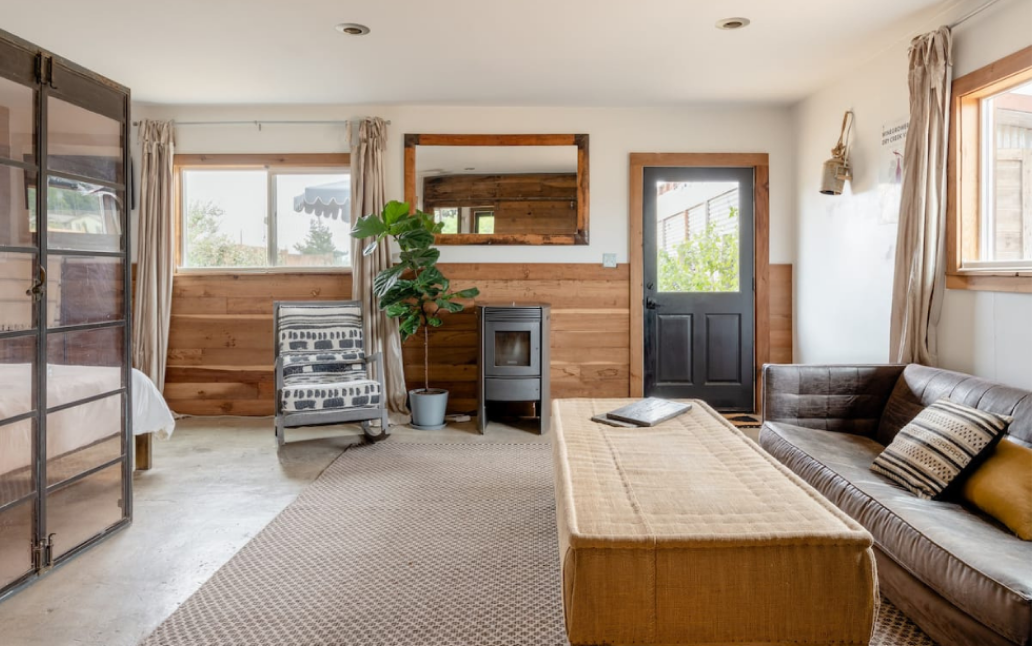
HB 1503 specifically prohibits certain restrictions on the regulations of accessory dwelling units. Cities must follow the standards in this bill and cannot enforce more restrictive regulations.
So what are those regulations?
- Your city must approve your ADU “by right” which means approval without a hearing or other discretionary zoning action other than the standard ADU application approval process
- Cities must allow at least one ADU on any lot with a single-family home.
- ADUs can be attached, detached, or internal to the main house.
- The ADU size must be no larger than 75% of the main home’s square footage, or 1,000 sq. ft.—whichever is less.
- No additional parking can be required for the ADU, and cities can’t charge fees in lieu of parking either.
- ADUs don’t need to match the exterior look, roof pitch, or materials of the main house.
- There’s no owner-occupancy requirement, meaning you don’t have to live in either the main house or the ADU.
- No special relationship (like family or employment) is required between people living in the ADU and the main house.
- Cities can’t charge more than $250 in development impact fees for the ADU.
- No required street or sidewalk upgrades unless the ADU construction directly disrupts them.
- ADUs can’t be held to stricter rules than the main house for setbacks, height, lot size, lot coverage, or building frontage.
- Cities can’t require a restrictive covenant on residentially zoned properties just to allow an ADU.
- You don’t need separate water or sewer connections from the main home.
- Cities can charge an application fee, but it’s capped at $250 per ADU (not including usual building permit fees).
- Cities can still regulate short-term rentals separately from these ADU rules.
- If there’s no municipal water or sewer, the unit must be approved by the Department of Health.
- Cities can’t adopt stricter ADU rules after January 1, 2026—but they’re allowed to adopt rules that are more lenient.
In short, Arkansas law sets a clear, statewide baseline that protects homeowners’ rights to build ADUs with minimal red tape. Cities must follow this baseline but can go further to encourage ADU development if they choose.
Types of ADUs Allowed in Arkansas
Arkansas allows attached, detached, and internal conversion ADUs. The type of ADU you choose will depend on various factors like property characteristics, personal needs, and budget.
Attached ADUs
Attached ADUs share at least one wall with the primary home. An attached ADU works well for properties with limited yard space since you don’t need to account for distance from the primary house like you would with a detached unit.
Connecting utilities may also be easier as you can reroute existing utility connection from the primary house to the ADU. This can help offset some of the construction costs.
If privacy is a concern, you can create separation between the two units with features like landscaping or fencing. For example, this attached garage was converted into a private one-bedroom ADU by positioning the entrance away from the front of the main house. The tenants enjoy their own dedicated entrance and outdoor space, making the unit feel like a completely separate home—even though it’s still connected to the main house.
Detached ADU
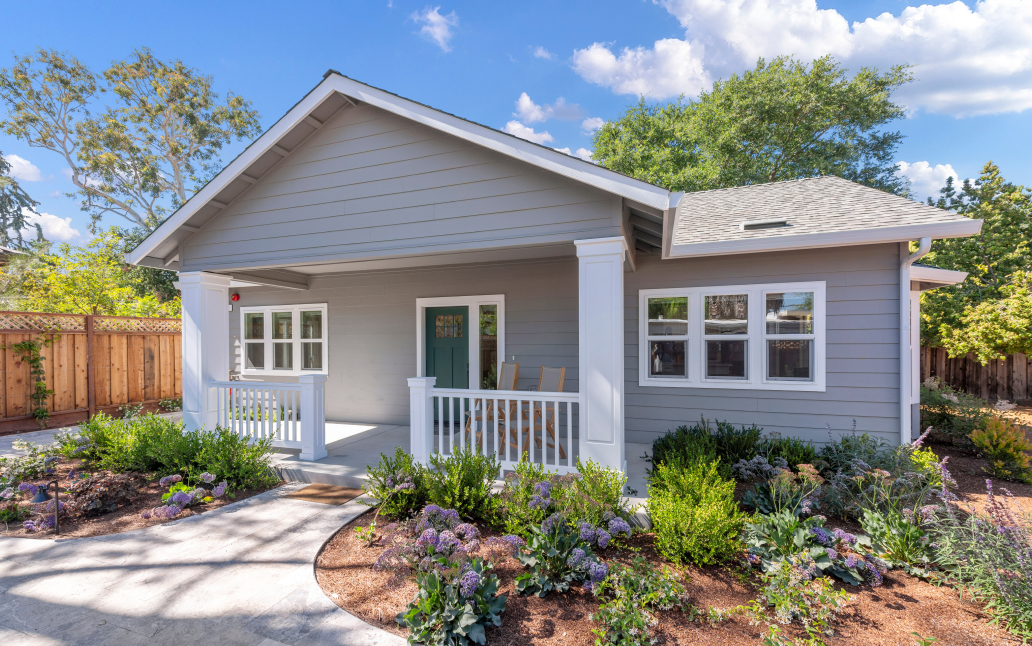
Detached ADUs offer the most flexibility when it comes to design and placement. As a completely independent structure you can also get creative with the overall style even if it’s a big departure from the style of primary home. In Arkansas, cities cannot require that the ADU match the style, finish, or roof pitch of the primary house.
However, keep in mind that detached ADUs are going to have the highest price tag than the other types of ADUs.
Internal Conversion ADU
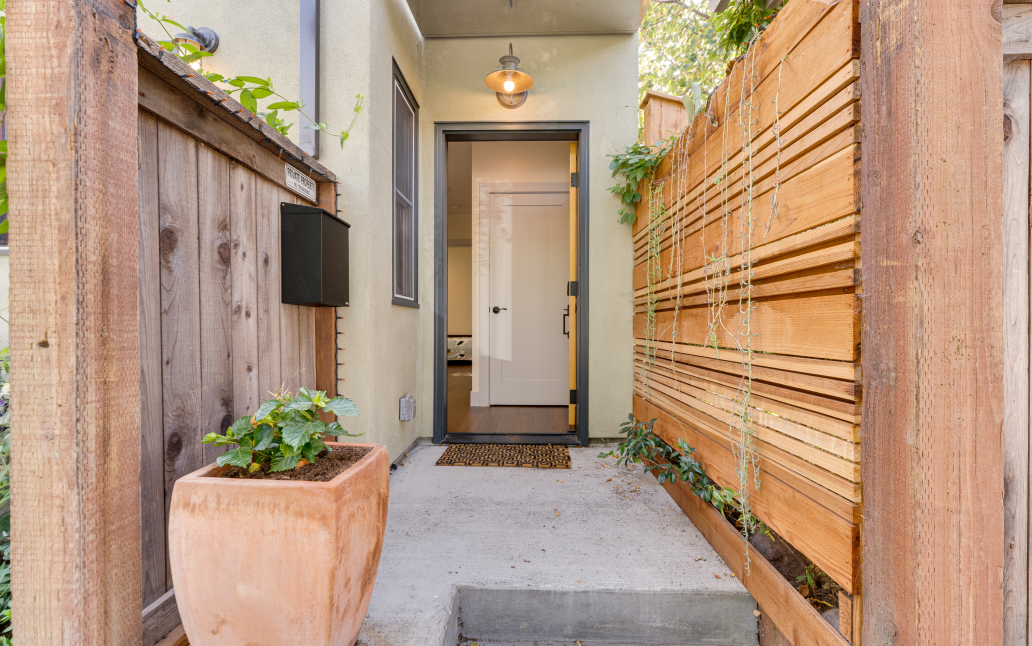
Internal conversion ADUs are created within the existing space of the primary home. This could include converting a basement, attic, or even a portion of the main house into a separate living unit. These types of ADUs are typically the most affordable to construct since they don’t require new foundations or exterior walls.
They’re an ideal choice for homeowners looking to create a rental unit or multigenerational living space while minimizing construction costs and preserving yard space. Just like other ADU types, internal conversions must include their own kitchen, bathroom, and separate entrance to qualify as a legal ADU under Arkansas law.
Can I build a Garage Conversion ADU in Arkansas?
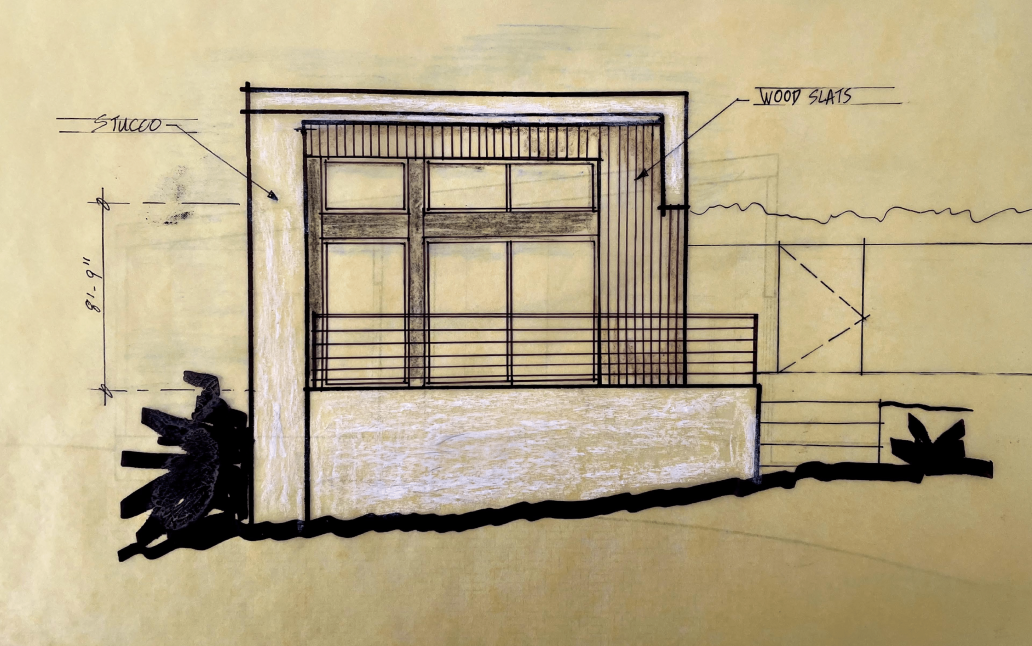
Short answer, yes.
HB 1503 does not address garage conversion ADU directly. However, it assumes that garage conversions fall under the types of ADUs outlined in the bill.
As long as your garage conversion meets the state’s basic ADU requirements—being self-contained, independently accessed, and compliant with applicable building and safety codes—the state will allow it “by right.” That means cities cannot require public hearings, special use permits, or impose additional zoning barriers beyond the standard application process.
Even better, HB 1503 prohibits cities from requiring extra parking for ADUs, which removes a common obstacle for garage conversions. So if you’re looking for a cost-effective way to add livable space or create a rental unit, converting your garage in Arkansas is not only possible—it’s protected by state law.
More ADU Resources
Maxable is the leading expert on accessory dwelling units, helping homeowners across the country plan, design, and build their ADUs with confidence. Whether you’re just getting started or already knee-deep in the process, our resources are here to guide you every step of the way.
Want to stay updated on ADU laws, design tips, and project inspiration?
Sign up for our newsletter and get our free ADU Tool Kit—a comprehensive guide packed with checklists, budgeting tools, and expert advice to kickstart your project!

